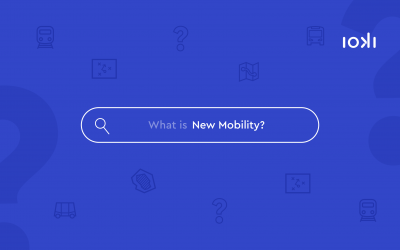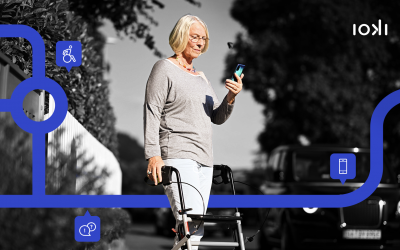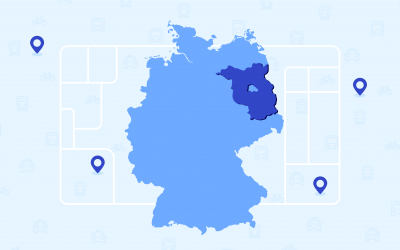What is GTFS-Flex?
GTFS stands for General Transit Feed Specification and is an open data standard. Transport companies around the world use this standard to provide their traffic data on routes, timetables, tariffs, but also real-time information. This allows passengers to see if a bus is delayed and is not limited to a local app when searching for a public transport connection.
Perspectives from Martin Grosch
Martin has been with ioki for more than two years. As a Senior Transport Planner in the Mobility Analytics & Consulting team, he mainly focuses on demand-responsive transport, mobility concepts and local public transport plans. He is also responsible for other interesting topics such as the internationalisation of the team’s product portfolio. The innovative local public transport plan project in and around Wiesbaden is exciting and innovative in many ways.
On stage for the first time: ioki insights live – moving mobility together
On 11 April 2024, we opened our doors to more than 50 customers. ioki insights – a regular webinar and information series for existing customers, as well as other formats – live and in colour for the first time. Mobility experts from all over Germany travelled to the event to gain first-hand impressions of the ioki product world as well as insights into on-demand transport and new mobility. Of course, there was also plenty of opportunity for networking and dialogue.
Perspectives from Henrik Umnus
The recently announced partnership between ioki and Vesputi promises innovations in the field of mobility services. Passengers can now buy their tickets directly in the on-demand apps from ioki. But what does this actually look like in reality? We spoke to Henrik Umnus, Managing Director of the Verkehrsbetrieb Greifswald GmbH. A year ago, the on-demand service “Friedrich” took to the streets of Greifswald and has been transporting passengers without a fixed timetable ever since. Now passengers can book their public transport tickets directly in the on-demand app. Have fun reading!
Perspectives from Milena Akemann
Milena works as a Technical Product Manager in the Mobility Analytics & Consulting team. She came to ioki through an internship after completing her maths degree. As a mathematician, she has a passion for anything related to optimisation and it was important to her to use her skills to shape the future. She then discovered the area of mobility through a seminar at university on mathematical transport planning.
What is… New Mobility?
“New Mobility” is often referred to as “smart mobility” and is a collective term for many innovations relating to technology and mobility. These new mobility services combine digitalisation with traditional mobility and use the advantages of the internet. New mobility services include bike sharing, demand-responsive transport, ride hailing and smart parking.
Senior-friendly public transport: What should age-appropriate public transport look like?
Europe’s population is ageing. in 2019, more than a fifth (20.3 per cent) of the EU-27 population was at least 65 years old. And the trend is still rising. Demographic change is a challenge for public transport, but it can also be an opportunity for growth with a customised mobility offer for senior citizens. After all, if older people no longer drive, they are increasingly dependent on public transport in order to continue to actively participate in social life.
“Mind the (Gender Data) Gap” – Diversity Lunch at ioki
Few social issues are as relevant as diversity and the inclusion of everyone in everyday life. This topic is also firmly embedded in our corporate values and we are committed to a diverse and inclusive culture. In order to actively implement and live up to these values, we have set up an internal working group dedicated to the important topics of diversity and inclusion.
Perspectives from Stefan Winter
Stefan jumped on the ioki wagon about two years ago and has been Senior Product Manager at ioki ever since. As a trained mechanical engineer, he has also held positions in management consulting and as a product owner and product manager in industry. At ioki, he came into contact with the mobility industry for the first time and is currently dealing with the most important questions about our new product ioki Route. In this interview, he talks about his everyday life, what makes ioki Route special and what drives us at ioki. Have fun reading!
ioki at Citytech UNextGen: How can cities become more liveable, safe and sustainable for everyone?
The Citytech UNextGen event in Milan has revolved around this question. The Head of Sales and Business Development at ioki, Laura Reupke, and our Sales and Business Development Manager Manuel Manzoni have attended the event and now look back to share some insights with us.
Perspectives from Mackenzie Banker
Smart mobility solutions use technology and innovation to improve mobility for everyone. Similarly, Smart Cities use innovative concepts and technological advancements to improve life in urban spaces. Both enable us to achieve the vision of more human-oriented and efficient places in cities.
Mobility Turn now! Mobility of the future in Brandenburg
In this edition of the blog series “Mobility turn now!”, we are focusing on the largest of Germany’s eastern federal states relating to area: Brandenburg. In addition to the Spreewald cucumbers and unspoilt nature, Brandenburg has a lot to offer in terms of new mobility and Smart Cities.












